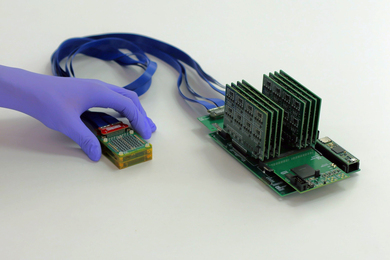MIT Medical has been one of the most active participants in IAP for many years, using the opportunity both to spread health information and to acquaint the community with the breadth of services available there.
With nearly 75 offerings, the Medical Department has something for almost everyone in the community, including nearsighted people, menopausal women and those experiencing anxiety and/or stress.
Dr. Matthew Garston, a senior optometrist at MIT Medical, will present "Laser Surgery or Glasses" at noon on Friday, Jan. 9 in Rm 1-190. He was surprised to find the room filled when he offered the seminar on laser surgery or glasses for the first time last year.
"There was a great deal of interest and very solid questions, mostly from students," he said. "They wanted to know if the surgery is safe, effective and long-lasting, as well as how much it costs." He noted that this surgery is not advisable for most undergraduates and some graduate students whose refractive needs are still changing, and that most health insurance plans do not cover the surgery.
Though laser surgery is improving all the time, Dr. Garston pointed out that it is not yet a completely predictable procedure. "About a quarter of those who try it find that they need a second procedure. Many others will still require glasses for some activities, but they can see the alarm clock when they wake up in the morning," he said. "As is true of many surgeries, advancing technology and surgical skills are offering better and better results as time goes on."
"Signs and Symptoms of Menopause" will be offered at noon on Tuesday, Jan. 13, followed by "Hormone Replacement Therapy: Pros and Cons" at noon on Thursday, Jan. 15 in Rm 1-135. Both sessions will be led by Dr. Lori Wroble, chief of obstetrics and gynecology.
Approaching menopause is an anxiety producer for many women, because of the changes it brings about in their bodies, noted Dr. Wroble, who first offered the IAP session three years ago.
"At first it was only one session, but there were so many questions that we decided to expand it to two, though one session or the other is of primary interest to most women," she said. Sometimes men attend as well.
The first session explores the various changes that women experience as menopause approaches and factors that can affect how they feel, such as diet and exercise. The second session addresses the pros and cons of hormone replacement, though, Dr. Wroble noted, "We are generally pro." She will explore the variety of hormone replacement therapies now available, as well as some expected to come on the market within the next year or so.
Studies of women's health are relatively recent. "We know so much more now than we did 20 years ago, but so much less than we will in the next 20 years," Dr. Wroble said. As an example, she cited the recent finding that postmenopausal women are at slightly higher risk than men for heart disease.
Nurse practitioner Marcia Yousik of the mental health service will present "Stress Management and Relaxation" from 2-3:30pm on Thursday, Jan. 15 in Rm 1-150, and "Anxiety and Stress" from 1-2pm on Friday, Jan. 30 in Rm 1-136.
Stress is a common health problem at MIT, according to Ms. Yousik, who is also MIT Medical's patient advocate. She has led the offering on stress management and anxiety for several years.
"Stress is usual in a place of transition, like a college," she said. "In a place like MIT where expectations are high, it applies to almost everyone at one time or another." The IAP presentation helps people recognize the symptoms of stress and introduces relaxation exercises "that can really make a difference."
"Not all stress is self-imposed," she noted. "Things like noisy neighbors and traffic congestion are stress producers that can often be alleviated by simple techniques."
Anxiety, on the other hand, can usually be traced to a specific cause or causes like deadlines, too much work to do, or approaching tests or evaluations, Ms. Yousik said. Though not preventable, its symptoms can be eased by analyzing the situation and addressing the component issues effectively.
"It's necessary to recognize the differences between stress and anxiety in order to apply the techniques that will ease them," she said.
For more information on these or other MIT Medical IAP offerings, visit the web or call Health Education at x3-1316.
A version of this article appeared in MIT Tech Talk on January 7, 1998.





